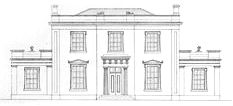Age
Charlotte tells us that she is 27 at the book’s opening.
Family and Situation
Charlotte is the daughter of Sir William Lucas and Lady Lucas, making her the sister of Maria Lucas and an undisclosed number of other Lucas children. She appears to be one of the oldest -- if not the oldest -- Lucas child, making it likely that she remembers a time before her father’s elevation to knighthood and retirement to Lucas Lodge.
We are not given much insight into the Lucas family life, but we do know that Charlotte is cajoling the entertainers into performing at the party at Lucas Lodge suggesting that her mother may not fully be up to the task of keeping a gentleman’s household. Mrs. Bennet also implies that she may sometimes participate in the household cooking.
By the middle of the novel, Charlotte is married to William Collins, the rector at Hunsford, Kent. As even Charlotte concedes that Collins is a ridiculous character, it is likely that her marriage is not one of love or companionship; we’re told that Hunsford Parsonage under Charlotte’s maintenance is a comfortable home, set up more around Collins than with him. However, by the end of the novel, Mr. Bennet reports receiving a letter from Collins whcih alludes to Charlotte being pregnant with what would be her first child.
Appearance
Mrs. Bennet implies that Charlotte is plain. Based on the fact that she’s 27 and has not yet secured a husband, it seems likely that she is either unattractive or at least unflirtatious.
Character
Charlotte is Elizabeth Bennet’s closest and most eminently practical friend. Often, this is manifest in a commitment to efficient and economical housekeeping. After Charlotte’s marriage to Collins, we’re told “Her home and her housekeeping, her parish and her poultry, and all their dependent concerns, had not yet lost their charms” and that she’s quite satisfied to keep house, even if it is for such a foolish character.
Despite the fact that she seems to have been quite unsuccessful with men personally, she argues more than once that women should make their intentions clear and should pursue any eligible prospects who happen to cross their paths, whether or not they are of romantic interest. This belief is best demonstrated by her decision to marry William Collins, which she achieves, in part, by consciously setting herself in his path after Lizzy’s rejection.
Charlotte also proves to be a valuable resource in helping Elizabeth secure a partner. She is the first character to notice Darcy’s pronounced attentions to her friend which, we are told, “she would liked to have believed this change the effect of love,” though she is initially unsure. We also have reason to believe that the transmission of expectations that Darcy may marry Elizabeth comes through Charlotte from her mother to Lady Catherine de Bourgh. Because of Charlotte’s practical nature, it may well be that she only sees this participation in Lizzy’s romance as helping her friend be as successful as possible in her marriage.
This keen observation likely stretches beyond Lizzy’s courtship, however. Mr. Collins’ consolatory letter upon Lydia’s elopement says “there is reason to suppose as my dear Charlotte informs me, that this licentiousness of behaviour in your daughter has proceeded from a faulty degree of indulgence”, suggesting that she has not thought too keenly of the Bennets’ parenting all along. Her additional perceptiveness about Jane’s lack of encouragement for Bingley suggests that she can be quite intelligent and observant about people, even if her actions are often mercenary. This is reflected in Lizzy’s departure from Hunsford where she concludes that though she does feel badly for Charlotte’s situation, “she had chosen it with her eyes open; and though evidently regretting that her visitors were to go, she did not seem to ask for compassion.”
